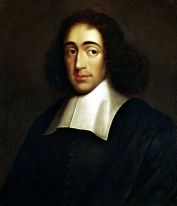

| Online: | |
| Visits: | |
| Stories: |

| Story Views | |
| Now: | |
| Last Hour: | |
| Last 24 Hours: | |
| Total: | |
Spinoza: Metaphysics and Science — the Truth of Quantum Reality
Tuesday, December 20, 2016 6:24
% of readers think this story is Fact. Add your two cents.
It has become a cliché that no one understands the strange behavior of the elementary particles that quantum mechanics describes. For example, how can an unobserved electron be in an infinite number of places at the same time? Or how can a particle of light – a photon – ‘sample’ all of space to ‘select’ the fastest path between two points in space, as Richard Feynman’s interpretation of quantum mechanics would say? One common theme in quantum mechanics is precisely this ‘unconstrained’ behavior of particles. This is consistent with the notion that there is a boundless or infinite aspect in nature underlying the reality we experience – which is precisely Spinoza’s view of substance.
Another theme in quantum mechanics is that the answer supplied by an experiment often depends on the question the experiment is asking. For example, elementary wave-particles can be seen to behave as either waves or particles depending on how an experiment is set up. Furthermore, it seems that observation is required to give quantum entities a determinate form. These two features of quantum mechanics suggest that there is a very close relationship between intelligence and corporeal nature in the universe, just as Spinoza supposed. To put it in Spinoza’s terms, intelligence and the material quantum events that intelligence observes are inseparable because they are two aspects of the same unique and boundless substance.
Click HERE
RR http://ufocon.blogspot.com – The UFO Iconoclast(s)
Source: http://ufocon.blogspot.com/2016/12/spinoza-metaphysics-and-science-truth.html



